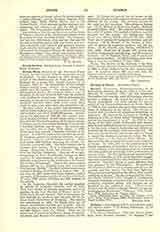

Divine Word, SOCIETY OF THE (SOCIETAS VERBI DIVINI), the first German Catholic missionary society established. It was founded in 1875 during the period of the Kulturkampf at Steyl, near Tegelen, Holland, by a priest, Rev. Arnold Janssen (d. January 15, 1909), for the propagation of the Catholic religion among pagan nations. It is composed of priests and lay brothers. On completion of their philosophical studies the students make a year of novitiate, at the end of which they take the ordinary vows binding for three years. Before ordination the members of the society make perpetual vows. The coadjutor brothers renew their vows every three years for nine years, when they take perpetual vows.
The first mission of the society was established in 1882 in Southern Shantung, China, a district containing 158 Catholics and about 10,000,000 pagans. According to the statistics of 1906-07, this mission numbered 35,378 Catholics, 36,367 catechumens, 1 seminary with 64 Chinese seminarians, 46 European priests, 12 Chinese priests, 13 coadjutor brothers of the society, 3 teaching brothers, and 19 nuns. The second mission founded was in Togo, West Africa, in 1892. There were then scarcely a hundred Catholics in the district. In 1906 the mission had a prefect Apostolic, 31 European priests, 12 coadjutor brothers, 14 nuns, 53 native teachers, and 68 mission stations. There were nearly 3000 children attending the schools; the Catholics numbered 3300. The third mission was in German New Guinea. It is a comparatively new colony. Dangerous fevers are common. The natives are Papuans (Negritos). They are all savages, recognizing no form of authority, having no fixed customs, or administration of justice. The greatest difficulty experienced by the missioners is the incredible number of languages. Thus in the entire mission district, 467 sq. m., probably more than a hundred languages are spoken. The first Catholic missionaries arrived in German New Guinea in August, 1896. At the close of 1906, there were in the mission a prefect Apostolic, 16 European priests, 13 coadjutor brothers, 18 nuns, 1000 native Catholics, and 400 children in the schools.
In the Argentine Republic the society numbers 51 priests, 31 coadjutor brothers, and 41 nuns. They have charge of colleges, seminaries, and of 12 parishes in the four Dioceses of Buenos Ayres, La Plata, Santa Fe, and Parana. Part of the mission district includes the territory once occupied by the famous Jesuit Reductions of Paraguay. The mission was established in 1898. In Brazil there are 29 priests, 14 coadjutor brothers, and 13 nuns. The society also has a mission in the United States, at Shermerville Techny, Cook Co., Illinois. There are 13 priests and 37 coadjutor brothers in charge of a technical school, and 30 nuns who conduct a home for the aged. In Europe the society has six houses or colleges with 126 priests, 546 coadjutor brothers, and 1089 students for the society. The training convent for the nuns has 231 members. The colleges in Europe are: (I) St. Michael, at Steyl near Tegelen, Holland, founded September 8, 1875. The superior general resides here with 47 priests, 314 coadjutor brothers, and 282 students for the society. (2) Heiligkreuz (Holy Cross) near Neisse, Silesia, founded October 24, 1892. There are 23 priests, 84 coadjutor brothers, and 241 students. (3) St. Wendel, in the Diocese of Trier, with 18 priests, 68 coadjutor brothers, and 185 students. (4) St. Gabriel, near Vienna, established October 4, 1889. There are 26 priests, 370 novices and students of philosophy and theology, and 80 coadjutor brothers. (5) St. Raphael, Rome, with 5 priests and one coadjutor brother. (6) Bischofshofen, near Salzburg in Austria, established August 17, 1904.
NUNS.—The Society of the Servants of the Holy Ghost (Societas Servarum Spiritus Sancti) was founded in 1889, at Steyl, Holland, by the Rev. Arnold Janssen. It numbers about 300 nuns who help the fathers in their missions, chiefly by teaching.
EB. LIMBROCK

